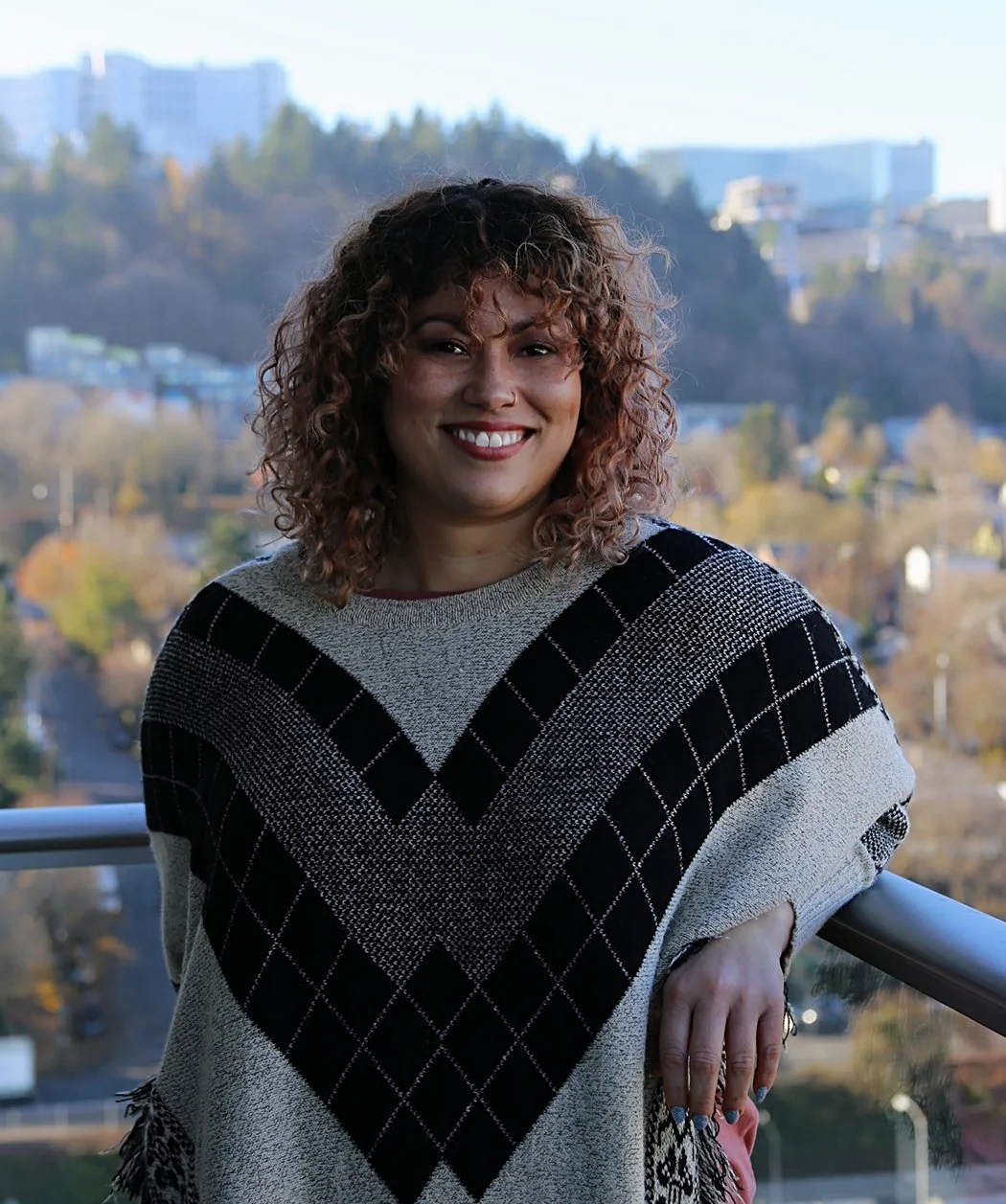Spring 2019 Newsletter: Member Spotlight — Yeruwelle de Rouen
A Note on This Year's Grantmaking
Hello, friends. Thank you for being champions of gender equity in your lives, and thank you for walking alongside us in our continued equity journey.
Some of you have been with us from the early days of the Women’s Foundation, and we appreciate you. Some of you have been doing the critical work in your community and have recently joined us as members. We thank you for seeing us and including us in your life.
As we’ve previously shared, this past year we dove deep into the continuous journey that is racial equity work. A big piece of this work is reckoning with our Foundation’s history. Our merger was a powerful catalyst for bringing our vision to life: one rooted in women helping women and in empowering a collective voice for community impact. It was also rooted in a broader history of philanthropy, of giving that often perpetuates the very inequalities and injustices it seeks to eliminate, by hoarding resources and upholding a particular version of the “worthy recipients” of foundation giving. (If you’re curious about learning more, we recommend Anand Giridharadas’ book Winners Take All and Edgar Villanueva's Decolonizing Wealth.)
In May, for the past four years, we’ve invited all of our members to vote on a set of finalists for our annual grantmaking. The results of that vote determined the size of the grant for each finalist. Although having members vote in this way was an important step toward democratizing our grantmaking, it didn’t fully move us into our desired outcome of disrupting the traditional and deeply problematic power structures in philanthropy.
Community voting can be a powerful model. But a critical part of our journey has been to realize that our membership community over the past five years – 75% middle/upper income white women from the Portland area – has not been representative of all women, girls, and femmes - especially those who are most impacted by issues of gender oppression in Oregon.
In effect, that meant communities of color, tribal nations, rural and frontier communities, and other communities targeted by systemic exclusion and violence, were being asked to make the case for their needs to a group of people who, for the most part, had little to no familiarity with their lived experiences. A truly equitable process would create meaningful space at the decision-making table for the most impacted women, girls, and femmes in Oregon, rather than burdening them with a voting process designed primarily for others.
Equity is hard because it challenges how we make sense of our world and ourselves. It’s the water we swim in. Our equity work is asking us to be proactive in unlearning white supremacy culture, listening with humility to the most impacted communities, and supporting their agency to be the architects of a world in which they can thrive.
We have navigated deep challenges since we embarked on this work and we’re not in denial of the challenges ahead. We are facing one of many critical moments in our organization, and it has provided us with continued moments of internal reflection. Our grantmaking is a big piece of where that reflection meets action. We are learning, in real time, how to push past the defaults we have inherited that are rooted in white supremacy, patriarchy, and inequity, and build something that will move us toward the values of equity.
So, during the time of year when our members have typically been voting on our grantees, we are taking the opportunity to share more about our journey toward a different approach to grantmaking. We are committing ourselves to a model of grantmaking that makes space for deeper community engagement and that elevates the voices of those so often excluded from institutional philanthropy.
This year, we are piloting our first Giving Project, a participatory model of grantmaking, with the support of a learning community of peer foundations. What excites us about this model is we get to invite you, our members, to participate in a six-month process of learning alongside a cohort of others to develop a deep racial and gender analysis, strengthen fundraising skills, and participate in an equity-informed grantmaking process.
We want to remain aspirational, even in the most challenging of moments. We will share more in the following months, including introducing our pilot Giving Project cohort and sharing our call for proposals in this new process. Please do reach out if you have questions or reflections!
Thank you for continuing to walk alongside us in this journey.
Onward Together,
The Women’s Foundation Team
Foundation Updates
IMMEDIATE IMPACT FUND
OUR IMMEDIATE IMPACT GRANT TO ADDRESS UNEXPECTED AND URGENT NEEDS FOR NONPROFITS WORKING ON GENDER EQUITY WILL BE AWARDED QUARTERLY THROUGH JUNE 2019.
EXAMPLES OF HOW THE GRANT CAN BE USED:
Unexpected material needs, such as repairs.
Timely programs or projects supporting the needs of women, girls, & femmes such as public education, mobilization, legal action.
Developing or expanding crisis support for critical and culturally-responsive services for women, girls, & femmes.
The next deadline for your ask to be considered is June 31st. Please reach out to our Program Manager, Ami at ami@w-for.org to see if you are eligible.
Grantee Spotlight
Our Winter Quarter Immediate Impact Fund is awarded to Treasure Valley Children's Relief Nursery, whose mission is to prevent child abuse and neglect in Malheur County by strengthening at-risk families through proven interventions.
The Immediate Impact Grant of $5,000 will help bring quality Family Connection events to clients. Moms attending grow their community support and get to learn and dialogue on topics that focus on keeping children safe and strengthening families.
Member Spotlight
Name: Yeruwelle de Rouen
Age: 36
Occupation: Diversity, Equity and Inclusion consultant
Member of the Women’s Foundation since… 2016
Gender pronouns: She/her/hers
Why are you a member of the Women’s Foundation?
I became a member when I learned of the narratives they were compiling across Oregon to provide a report depicting the conditions that women and girls currently live in. In my work I had sought this type of data many times and knew how great the need was. I was impressed that the Women's Foundation was willing to lead this large effort and felt compelled to become a member. We now know this report as Count Her In and I am grateful for the statewide overview and clear starting points for elevating the status of women throughout Oregon.
What quality do you most admire in others?
There is nothing more admirable to me than someone who views the world through a lens of compassion, as compassion moves us past awareness of problems and towards solution-oriented engagement when we become aware of need.
What was your first volunteer experience?
I was raised in a church-centered community and a family culture where giving “in service” is expected so volunteering was apart of my regular experience. Volunteering became an important aspect of my internal identity around the age of 10 when I helped my mom collect, clean and organize items for a clothes pantry at our local pregnancy resource center. Witnessing the physical relief of teen moms as they selected car seats, diapers and clothing from the pantry sparked the understanding of how small, collective actions support the whole community. I’ve been hooked ever since!
What do you consider your greatest achievement?
Designing my life - education, career, civic engagement and relationships – so to evade the division of my morals, culture, intuition, or spirit from what I do each day. This has led to a fulfilling and rewarding path.
Why is gender equity important to you?
I believe that gender equity is key to the systemic changes many crave and the environment is demanding, today. Current cultural systems, theories and institution have been constructed as hierarchies. No matter the origin of the hierarchy (Individualism? Capitalism? Industrialization? Patriarchy?), each has been structured so that the female gender is at the bottom of this grand pyramid scheme. Repositioning women means progressing from a society of domination and hierarchy to cooperative systems, which would allow for a needed shift in our collective consciousness and trajectory.
Which woman (living or dead) do you most admire?
Sojourner Truth, born an American slave, she became the matriarch of the concept of intersecting identities. Sojourner was a valiant activist, brilliantly pushing beyond racial and gender inequality to expose how the black, American female experience is erased when women are the bottom of the hierarchy, women’s issues are viewed through white supremacy, and racism is a black mans burden. This intersectional perspective of identity and inclusion is still needed and relevant today so I honor her for bringing this to our social awareness.
What’s your most treasured possession?
My most treasured possessions are those I’ve inherited from my family. My paternal grandmother left many small treasures – from ceramic owls to teapots – that I adore keeping as each item connects me to pieces of her past joys.
What is your personal motto?
If it is needlessly or negatively impacting my energy it is not for me.
What thought or intention do you want to leave with Foundation members today?
“The greatness of a community is most accurately measured by the compassionate actions of its members.” – Coretta Scott King
I can’t say it better than that!
What does being anti-racist mean to you?
Anti-racism is an active process - action, strategy, theory, and practice - that we each engage in to eliminate racism, inequality, discrimination and prejudice as it is encountered or recognized. Anti-racism stems from our pre-determined intentions and commitment to the removal of all injustice. I believe that when our movements are compassionate and anti-racist will we be able to achieve partnership-centered systems and dismantle the hierarchies built on domination. As Angela Davis said, “feminism will be anti-racist or it won’t be.”
Can you share an experience where you felt connected to the mission/values of the Women's Foundation?
A few years ago I saw Emily present and she explained the foundation’s commitment to intersectionality, as she announced that they would no longer participate in non-inclusive panels/events where many voices are invisible or marginalized. The Foundation’s actionable commitment to work with all people demonstrates humanitarian leadership and feminist strength, which is key to establishing genuine community and thriving impact.
Thanks so much, Yeruwelle!
Membership Matters
Won't you join our growing community and strengthen our collective force for gender equity in Oregon?
We'd like to thank the following companies for joining the Women's Foundation Corporate Partnership program.
Cambia Health Solutions
DHM
Heritage Bank
U.S. Bank
Vision Capital Management Inc.
Vista Capital Management
Wells Fargo


